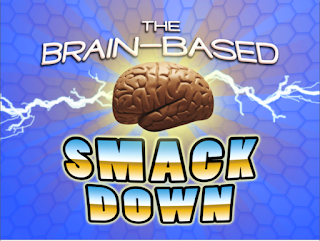 (Note: This entry will also be posted at the Experient E4 Blog)
(Note: This entry will also be posted at the Experient E4 Blog)
In the Brain-Based Events Exchange Café at e4, the audience was divided into two teams and we played the Brain-Based Smackdown (an audience response game show). Now, we didn’t just play the game for fun’s sake (though it certainly was a lot of fun), we added both the team interaction and the competition into the presentation to increase the success of the event.
Why put the audience into teams and add competition into an event?
· A person can get lost in an audience of 100…500…1000… It’s more difficult to get lost in a team of 10-20.
· Being on a team provides a personal, supportive environment at an event.
· Having team competition makes attendees accountable to their peers for engaging in the event.
· Competition reinforces content and adds energy, excitement, emotion and engagement.
Ways to add competition:
Game shows: Game shows are a great way for teams to earn points in a team competition. You can either add a single game to a workshop/breakout session, or have a game that runs throughout the day (previewing information, reviewing information, teaching information, etc). You can use the same format in different rounds (i.e. Multiple matches of a Jeopardy-style game) or you can use different game formats. Game shows can even be structured in tournament style to make them an event within the training.
Audience-response game shows can be particularly effective. Everyone has their own game pad so everyone plays along (and individual scores go towards the team tally).
Knowledge Bucks: A great way to keep individuals engaged and participating in a less structured session is "Monopoly money" or Knowledge Bucks. This funny-money can be given out when individuals respond to a question, arrive on time, etc. Team members can put them in a designated box, and they are added to the team's total score. These can be tallied during breaks.
Energizers: Have the teams organize a post-lunch cheer, with the most creative, on-point and well-executed cheer receiving the most points. Have a paper-toss where members write questions on paper, crumple them up and toss them around until a designated time period passes and one person from each team must answer the question in their hand--for a certain number of points a piece. Activities like this both contribute to the energy of the room and the team competition.
Leader Board: Have a leader board that shows the tally of team scores for all activities--game shows, knowledge bucks, team cheers, etc. Update it at breaks so teams can see where they stand and to stoke a little competition. This doesn't have to be anything fancy--a grid on a white board or a PowerPoint slide will do nicely.
Knowledge Bucks: A great way to keep individuals engaged and participating in a less structured session is "Monopoly money" or Knowledge Bucks. This funny-money can be given out when individuals respond to a question, arrive on time, etc. Team members can put them in a designated box, and they are added to the team's total score. These can be tallied during breaks.
Energizers: Have the teams organize a post-lunch cheer, with the most creative, on-point and well-executed cheer receiving the most points. Have a paper-toss where members write questions on paper, crumple them up and toss them around until a designated time period passes and one person from each team must answer the question in their hand--for a certain number of points a piece. Activities like this both contribute to the energy of the room and the team competition.
Leader Board: Have a leader board that shows the tally of team scores for all activities--game shows, knowledge bucks, team cheers, etc. Update it at breaks so teams can see where they stand and to stoke a little competition. This doesn't have to be anything fancy--a grid on a white board or a PowerPoint slide will do nicely.
Dan Yaman is the Founder and CEO of Live Spark, the event design firm that produced Eddie and Ellie the eagles. Live Spark also consults on presentations and events, designs custom game and audience-response experiences and more. You can check out our blog for more tips and event insights—or check back here for more postings to come.

No comments:
Post a Comment